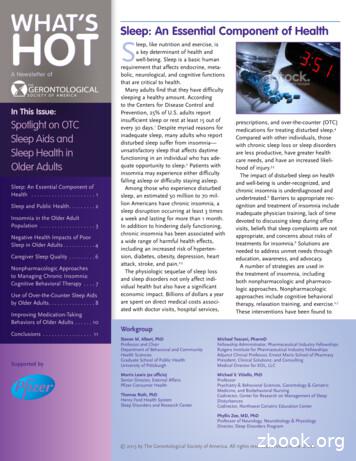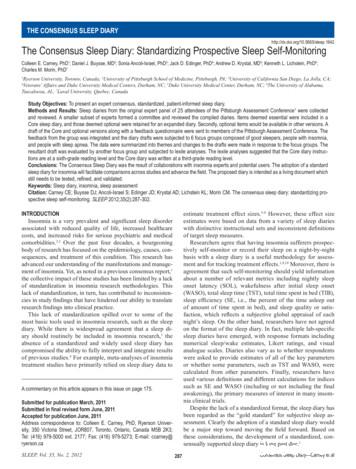Participant Guide - Get Enough Sleep
Participant GuideGet Enough Sleep
Session FocusGetting enough sleep can help you prevent or delaytype 2 diabetes.This session we will talk about:zz Whysleep matterszz Some challenges of getting enough sleep and ways tocope with themYou will also make a new action plan!Tips: Go to bed and get up at the same timeeach day. This helps your body get ona schedule. Follow a bedtime routine that helps youwind down.Participant Guide: Get Enough Sleep2
Jenny’s StoryJenny is at risk for type 2 diabetes. Her doctor asksher if she gets at least 7 hours of sleep each night.Jenny laughs. “Are you serious?” she asks. “I’m luckyif I get 5 hours.”Jenny usually doesn’t have much trouble fallingasleep. But she often has to use the bathroom inthe early morning. This gets her thinking about allthe things she needs to do the next day. Plus, herhusband’s breathing is loud. Both of these thingsmake it hard for Jenny to fall back to sleep. She oftenlies awake for hours.These days, Jenny drinks less water and avoids caffeine inthe evening. She makes a list of things to do the next day.Then she sets it aside.Jenny rarely needs to get up to use the bathroom during thenight. If she does, she breathes deeply to help her get backto sleep. She also runs a fan to cover up the sound of herhusband’s breathing.Jenny is closer to getting 7 hours of sleep a night.What makes it hard for you to get a good night’s sleep?Participant Guide: Get Enough Sleep3
How to Cope with ChallengesIt can be challenging to get enough sleep. Here are some common challengesand ways to cope with them. Write your own ideas in the column that says“Other Ways to Cope.” Check off each idea you try.ChallengeI stay up toolate gettingthings done.Ways to CopePlan ahead so that youfinish earlier.Ask family and friends to help youget things done.Save some tasks for another day.Make a list of things to do the nextday. Then set it aside.I’m too hot ortoo cold.My bed partneris restless,breathesloudly, orsnores.Other Waysto CopeTurn the heat up or down. Or opena window.Dress for the weather.Choose the right bedding.Take a warm or cool bathor shower.Ask your partner to blow theirnose. Keep a box of tissues next tothe bed.Ask your partner to sleep on theirside or stomach.Ask your partner to get help fromtheir healthcare provider.Participant Guide: Get Enough Sleep4
How to Cope with ChallengesChallengeThere’s toomuch noise.There’s toomuch light.I can’t getcomfortable.I’m thirsty.I keep gettingup to use thebathroom.Ways to CopeOther Waysto CopeUse earplugs.Turn on a fan, white noisemachine, or radio tuned to staticto drown out the noise. Or use asmart phone app that plays whitenoise or nature sounds.Shut the doors and windows.Ask people to be quiet.Get room-darkening blindsor shades.Wear a sleep mask.Stretch.If possible, get a bed, mattress,and pillow that you like.Have a drink at least two hoursbefore bedtime.If you must drink at bedtime, havejust a sip.Avoid caffeine and alcohol.Stop drinking at least two hoursbefore bedtime.Participant Guide: Get Enough Sleep5
How to Cope with ChallengesChallengeI feel anxiousor alert.Ways to CopeDuring the day:Get up at the same time eachday. This helps your body get ona schedule.Avoid caffeine.If you smoke, quit.Avoid naps. Or keep them very short.Be active.Manage stress.Ask your healthcare provider if yourmedicines are keeping you awake.A couple of hours before bedtime:Avoid using a computer, cell phone,or TV. The light can make yourbrain think it’s time to be awake.Avoid working or being very active.Follow a bedtime routine that helpsyou wind down.At bedtime:Go to bed at the same time eachday. This helps your body get on aschedule.Don’t pressure yourself to fall asleep.Keep clocks and watches out ofsight so you don’t think about timepassing.If you don’t think you will fall asleepsoon, get out of bed. Do somethingrelaxing for a while.Participant Guide: Get Enough SleepOther Waysto Cope6
Ways to UnwindIt’s a good idea to follow a bedtime routine that helps youwind down. Try to start a couple of hours before bedtime.Here are some ways to unwind.zz Breathedeeply.zz Dim the lights.zz Drink herbal tea or warm milk.zz Get a massage.zz Listen to soothing music.zz Make a list of things to do the next day.zz Read a soothing book.zz Sit outside.zz Stretch.zz Take a warm bath or shower.zz Write in a journal.What helps you unwind at the end of the day?Participant Guide: Get Enough Sleep7
each day. This helps your body get on a schedule. Follow a bedtime routine that helps you wind down. Participant Guide Get nough Sleep 3 . Challenge : Ways to Cope Other Ways : to Cope There’s too much noise. Use earplugs. Tur
Nov 12, 2018 · 2 The Sleep in America poll was run alongside the National Sleep Foundation’s validated sleep health assessment tool, the Sleep Health Index , which has been fielded quarterly since 2016.The Index is based on measures of sleep duration, sleep quality and disordered sleep. Am
sleep, your body is better able to fight off infections, as it can focus on this, rather than on getting you through your daily activities. WELLNESS GUIDE - SLEEP BETTER - DISCOVER THE POWER OF SLEEP Being sick can put a hold on your fitness efforts, so be sure to get enough sleep so that you are healthy enough to exercise regularly.
uals experience disturbed sleep at least a few nights each week12 . Research presented at SLEEP 2013, the 27th Annual Meeting of the Associated Professional Sleep Societies, LLC, addressed sleep-related topics ranging from basic sleep science, such as cell and molecular genetics, to such clinical topics as sleep disorders and sleep and aging .
Academy of Sleep Medicine, the Department of Health and Human Services, the National Sleep Foundation, and the Sleep Research Society Contract no. N01-OD-4-2139 ISBN 0-309-10111-5 (hardback) 1. Sleep disordersÑSocial aspects. 2. Sleep deprivationÑSocial aspects. 3. SleepÑSocial aspects. 4. Public health. I.
The Pittsburgh Sleep Quality Index (PSQI) 21 is a 19-item ques-tionnaire used to measure sleep quality complaints. Seven com-ponent scores assess habitual duration of sleep, nocturnal sleep disturbances, sleep latency, sleep quality, daytime dysfunction, sleep medication usage
(WASO), total sleep time (TST), total time spent in bed (TIB), sleep efficiency (SE, i.e., the percent of the time asleep out of amount of time spent in bed), and sleep quality or satis-faction, which reflects a subjective global appraisal of each night's sleep. On the other hand, researchers have not agreed on the format of the sleep diary.
then compared with that of sleep deprived non-epileptic mice along with their non-sleep deprived peers. The mice, which have sleep cycles as short as 30 - 90 seconds, are deprived of sleep for 6 hours to up to 3 weeks at a time using a physical stimulus to awaken them. This research is being used to simulate sleep apnea and chronic sleep
No. Per API 650 Section 3.2.4, the tank is limited to one in. of water vacuum (roughly 25 mm). If the tank must be designed for 50 mm water vacuum, then this is a special design which is not covered by API 650. 3.2.4 9th - May 1993 Should the vacuum relief system set pressure be 25 mm of water if the required design vacuum condition is 50 mm of water? API 650 does not cover the required .























